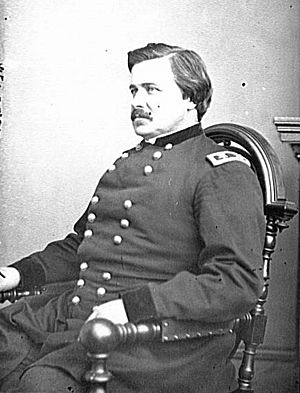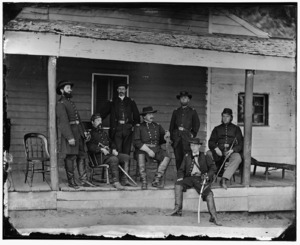Alexander McDowell McCook facts for kids
Quick facts for kids
Alexander McDowell McCook
|
|
|---|---|

Alexander McDowell McCook
|
|
| Born | April 22, 1831 Columbiana County, Ohio |
| Died | June 12, 1903 (aged 72) Dayton, Ohio |
| Place of burial |
Spring Grove Cemetery,
Cincinnati, Ohio |
| Allegiance | United States of America Union |
| Service/ |
United States Army Union Army |
| Years of service | 1852–1895 |
| Rank | |
| Commands held | 1st Ohio Infantry XX Corps 10th U.S. Infantry 6th U.S. Infantry |
| Battles/wars | American Civil War |
Alexander McDowell McCook (born April 22, 1831 – died June 12, 1903) was a brave American soldier who spent his entire career in the United States Army. He became a Union general during the American Civil War. He was part of a famous military family known as "The Fighting McCooks".
Early Life and Training
Alexander McCook was born in Columbiana County, Ohio. His family was very involved in the army. His father, Daniel McCook, and seven of Alexander's brothers fought in the Civil War. Five of his cousins also became soldiers. Because so many of them served, they were called "The Fighting McCooks". A place called McCook Field in Dayton, Ohio, was even named after them.
Alexander McCook went to the United States Military Academy (West Point) and graduated in 1852. After West Point, he served as a soldier in New Mexico from 1853 to 1857. There, he helped in conflicts against the Apache and Ute tribes. From 1858 to 1861, he taught infantry tactics (how soldiers fight on foot) at West Point.
Fighting in the Civil War
When the Civil War began in April 1861, McCook was made a colonel of the 1st Ohio Infantry regiment. He helped defend Washington, D.C., and fought in the First Battle of Bull Run. In September 1861, he was promoted to brigadier general. He then led a large group of soldiers (a division) in Tennessee.
McCook earned a special honor, called a brevet, for his part in capturing Nashville, Tennessee. This honor gave him the rank of lieutenant colonel in the regular army. He then led the 2nd Division in the Army of the Ohio at the Battle of Shiloh. After that, he was part of the campaign against Corinth, Mississippi. In July 1862, he was promoted again to major general.
McCook was given command of the I Corps in the Army of the Ohio. His soldiers faced tough battles and suffered many losses. At the Battle of Perryville in October 1862, his corps was pushed back a mile.
Later, his command was renamed the Right Wing of the XIV Corps in the new Army of the Cumberland. His troops again had many casualties at the Battle of Stones River. The army structure changed once more, and his corps became the XX Corps.
At the Battle of Chickamauga, McCook's troops were again badly hit and forced to retreat. After this battle, he was investigated for the Union's big loss. He was not found guilty, but he was removed from his command in the Army of the Cumberland.
He waited almost a year before getting another command. This happened when Confederate General Jubal Early threatened Washington, D.C. McCook was put in charge of defending the capital at the Battle of Fort Stevens. The day the battle ended, his command of the city's defenses also ended. He was again without a command.
Near the end of the war, he was given command of the District of Eastern Arkansas. He received more brevet promotions, becoming a brigadier general and major general in the regular army for his service throughout the war.
After the War
McCook left the volunteer service in October 1865. In March 1867, he became a lieutenant colonel in the 26th Infantry. He served in Texas, mostly at military bases, until 1874.
From 1875 to 1880, he worked as a personal assistant (aide-de-camp) to the top general of the U.S. Army, General William T. Sherman. Later, from 1886 to 1890, he commanded Fort Leavenworth, Kansas, and the army school there. He then led military departments in Arizona (1890-1893) and Colorado (1893-1895).
McCook became a full brigadier general in 1890 and a major general in 1894. He retired from the army in 1895. From 1898 to 1899, he served on a special group that looked into how the United States Department of War was run during the Spanish–American War.
Alexander McDowell McCook passed away in Dayton, Ohio, on June 12, 1903. He is buried in Spring Grove Cemetery in Cincinnati, Ohio. The town of McCook, Nebraska, was named in his honor.
See also
 In Spanish: Alexander McCook para niños
In Spanish: Alexander McCook para niños
 | Ernest Everett Just |
 | Mary Jackson |
 | Emmett Chappelle |
 | Marie Maynard Daly |


